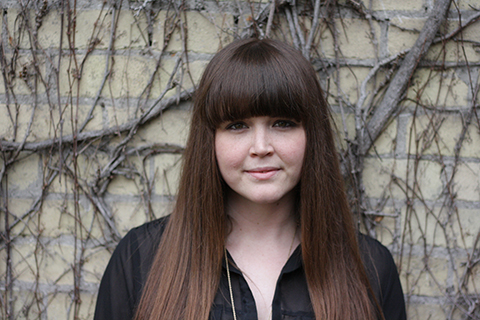As a teenager, Laura Clarke (MA 2010) frequently wrote poetry, but it wasn’t until she won a Hamilton Spectator poetry contest at 17 that she began to believe in her talents. “It gave me confidence,” she says. “Young writers can often feel secretive about their work.”
This spring, Clarke celebrated another win with the RBC Bronwen Wallace Award for Emerging Writers, which recognizes wordsmiths under age 35 whose work has yet to be published in book form. Her offbeat series Mule Variations bested more than 130 submissions as the top entry.
In her collection, Clarke lends mules anthropomorphic qualities. She includes poems from the mule’s perspective and creates imagined dialogue between the creature and other animal and human characters.
“I thought it would be an interesting concept,” says Clarke, 28, of making mules – the offspring of a donkey and horse – the focus. “They are sterile, but occasionally one can miraculously give birth. The combined traits of mules lead to hybrid vigour. I found something poetic about it.”
Her verses stem from an interest in the research of Jerry Leath Mills, an academic authority on the significance of dead mules in southern American literature. Clarke meditates on mule lore, reproduction and morbid suggestions for how the animals might meet their end – such as “Decapitated by an irate opera singer,” a line borrowed from Cormac McCarthy’s The Crossing. “I took those ideas and ran with them,” she says.
Inspired by Toronto’s writing scene and Canadian poets, Clarke credits John Steffler’s (BA 1971 UC) The Grey Islands and “every single thing ever” by Anne Carson (BA 1974 St. Mike’s, MA 1975, PhD 1981) for showing her “the strange narrative possibilities of poetry as a younger writer.”
Clarke’s MA in English with a specialization in creative writing allowed her to stretch her abilities and grow as a poet. Literary heavyweights on the faculty, including Rosemary Sullivan and George Elliott Clarke, encouraged her to experiment with different forms and read a range of writers. “It was a bit intimidating at first, but I definitely learned a lot,” she says. “They got me to step out of the CanLit box and exposed me to American and European writers.”
Clarke says the mentorship component was a big part of the creative-writing program’s appeal. In her second year, she worked with Griffin Prize winner Ken Babstock on her thesis – narrative poems with animal themes that continue to stimulate her work today. Clarke appreciates poets such as Babstock – known for his dynamic style – for their ability “to get totally weird.”
“It makes me stop and think that maybe I’m being too safe writing another poem about my childhood trip to get ice cream at the convenience store,” she says.
Clarke plans to use the $5,000 prize to fund the completion of a book-length manuscript on animals in the urban environment, which she hopes to finish by year’s end.
“I like to write about what I see on the news and in pop culture, whether it’s raccoons invading neighbourhoods or deer being Tasered downtown,” says Clarke. “Everyone loves a good YouTube clip. I hate to say that animal videos were the inspiration for my work, but they really were the touching-off point.”





